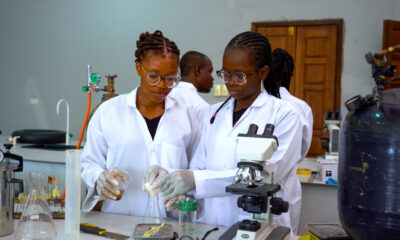Features
BN Climate Change Conversation: Esther Emphasizes How Climate Change Affects Agriculture in Nigeria
With increasing temperature and consistent changes in rainfall tied to climate change, the agriculture-based value chain in Nigeria is threatened with a possibility of affecting jobs and lifestyles of 70 million people. Year in, year out, as the climate continues to change, farm yields become poorer, flooding affects farm outputs and the life span of farm products becomes shorter. In many other ways, the gross impact of climate change is affecting Nigeria greatly.
 Today, we’re concluding the BellaNaija Climate Change Conversation by sharing Esther Agbarakwe‘s insight on how Climate Change is affecting Nigerians. Esther is the Climate Focal Point for the United Nations Secretary-General’s Envoy on Youth. She is responsible for the public mobilization for climate action. Between 2015 and 2018, Esther was the Special Advisor, on Strategic Communications, to the Mininster of Environment of Nigeria. She has over a decade of experience working on youth and public mobilization in Nigeria. You can read our interview with her from 2011 HERE.
Today, we’re concluding the BellaNaija Climate Change Conversation by sharing Esther Agbarakwe‘s insight on how Climate Change is affecting Nigerians. Esther is the Climate Focal Point for the United Nations Secretary-General’s Envoy on Youth. She is responsible for the public mobilization for climate action. Between 2015 and 2018, Esther was the Special Advisor, on Strategic Communications, to the Mininster of Environment of Nigeria. She has over a decade of experience working on youth and public mobilization in Nigeria. You can read our interview with her from 2011 HERE.
Esther emphasizes the need to pat attention to Climate Change because of its effect on agriculture in Nigeria. We depend heavily on food in order to survive. Unfortunately, agriculture in Nigeria seems to be threatened by the rising change in our climate. In April, Nigerians suffered severe heatwaves and currently, the rains are pouring down heavily – which shouldn’t be. To avoid starvation, we must pay better attention to Climate Change in Nigeria and the many danger it poses to our agricultural sector, and the economy at large. We must start planting more trees and teaching everyone around us what climate change is and its consequences. We hope you find Esther’s insights useful.
Talking about climate change in the Nigerian space is super important!
Nigeria is a strategic country for many reasons and the subject of climate change is a very important one, it is about our human existence; the center of all other engagement is subject to having a habitable planet. Across the world, not just in Nigeria, we can only talk about business, education, health care, politics, gender, and the likes, because there is a planet to carry out all these.
The rapid change in the climate is posing a global threat to our existence; this explains why the conversation about climate change is taking the central stage on international platforms and equally deserving more attention on the Nigerian scene.
Climate change knows no boundaries, no race, no continent, no age group, no financial status – this explains why Nigeria, like other forward-moving countries, should beam more spotlights on more prioritizing climate action and introduce a sustainable approach to doing business, all in the interest of the people, planet, and posterity.
Communicating the issue of Climate Change to average Nigerians
A major challenge that has remained a setback for Climate Action across the world is tied to the issues of communication, or should I say miscommunication? Putting Nigeria in focus, many people try to explain the concept of climate change through a global lens. The impact of climate change is felt everywhere. Even my Mom, who is a smallholder farmer is feeling the brunt of it, and without any insurance of any sort.
Imagine communicating Climate Change to an 87-year-old farmer in Babura village in Jigawa State using terminologies like Adaptation, Mitigation, Resilience, Carbon Neutral, Sequestration, Emission, etc.? Such efforts will be futile! Such farmer would understand the concept of climate change if he sees it in the context of the changing pattern in rainfall over the last 10 years which has caused him to make wrong planting decisions and resulted in poor annual yields.
How productive do you think it will be to tell a hunter in Apiapum community of Cross River about poaching and wildlife extinction? Such hunter would understand better if you explain that the raising temperature in some areas has made it impossible for some animals to live within their homes, hence, they have to look for more comfortable places to live and breed. This makes it impossible for them to see such animals when they go hunting.
When fishermen in the Ijaw area of Bayelsa lament about the disappearance of fishes, we won’t open the Intergovernmental Panel on Climate Change report to show them statistics about the rising sea levels. That will be unproductive! We would rather explain in the context that the sizes of water bodies are reducing because of the dryness experienced in neighbouring areas.
In Nigeria today, Communication is key to addressing climate change. Institutions, Individuals, Groups, and Companies that are focused on educating people about climate change must be deliberate about how they localize their respective concepts of communicating Climate Change to their particular audience.
It is unwise to wait, let’s start addressing this issue now!
In Nigeria today, the Agricultural sector employs 36.55% of the total population – according to tradingeconomics (2017), and is the second-highest contributor to Nigeria’s Gross Domestic Product at 20.85% – according to Statista (2017)
With increasing temperature and consistent changes in rainfall tied to climate change, the agriculture-based value chain in Nigeria is threatened with a possibility of affecting jobs and lifestyles of 70 million people. Year in, year out, as the climate continues to change, farm yields become poorer, flooding affects farm outputs and the life span of farm products becomes shorter. In many other ways, the gross impact of climate change is affecting Nigeria greatly.
Increased investment in agriculture can really guarantee food security, have the potential to be a major contributor to job creation and be able to arrest the problem of food insufficiency. Climate change poses greater risk to agriculture.
We are feeling the impact already! We will be mistaken to wait until we experience the heat waves in Europe or Earthquakes in Asia before coming to terms with the impact of climate change here in Nigeria. We must understand that the indices of climate change in Asia are different from indices on the African continent. Even across the African continent, there are variations; the impact in East Africa will not be a replica of what happens in Central Africa.
As an individual, it will be inaccurate to say we still have 20 years before we act. We must believe the science; the Intergovernmental Panel on Climate Change has projected that we have until 2050 to attain net-zero carbon dioxide emissions if we will prevent global warming of 1.5°C.
Not sure of what you can do to help? Esther breaks it down:
To address Climate Change, the first thing every Nigerian should incorporate is to deliberately take time to learn about Climate Change and see themselves as ambassadors to rightly communicate the issue of climate change in ways that people around them can understand clearly.
Secondly, citizens must know how powerful they can be in urging their government at federal, state and local levels to take bold actions to reduce emissions, embrace sustainable investments and build a strong, diverse, equitable and clean economy. You can choose to join a movement that is focused on one or many approaches to address climate change, for example, a tree-planting group, a climate strike group, a climate education forum, etc.
Having visited other countries, I see how people, regardless of their wealth or social portfolio, embrace walking and cycling as a means of transportation. Nigerians must begin to disabuse the “I must drive my car” mentality, carpool – where available and reduce flight travels – where possible.
In Nigeria today, there is an impressively increasing number of recycling firms in urban areas. Nigerians should look out for such facilities and organizations, identify with them and engage others to recycle their used items.
Climate Change isn’t the least of our worries, it’s a huge problem
The Sustainable Development Goals clearly shows the interconnectedness of these issues. However, as I stated in my opening thoughts, climate change is tied to human existence, the center of all other engagement is subject to having a habitable planet. This is true across the world, not just in Nigeria. We can only talk about business, education, health care, politics, gender, and the likes because there is a planet to carry out all these.
We need to act now. Start planting that tree!
As individuals, there is so much we can do respectively to address Climate Change; however, the bigger task is for us to demand that the government, international community, and businesses act with the understanding that Climate Change is real and that the impact will last for a lifetime. In addition, we must, in every way we can, support the aforementioned group to act for the climate, we must support them with our own individual actions like recycling, tree planting, using public transport and reducing waste.
























